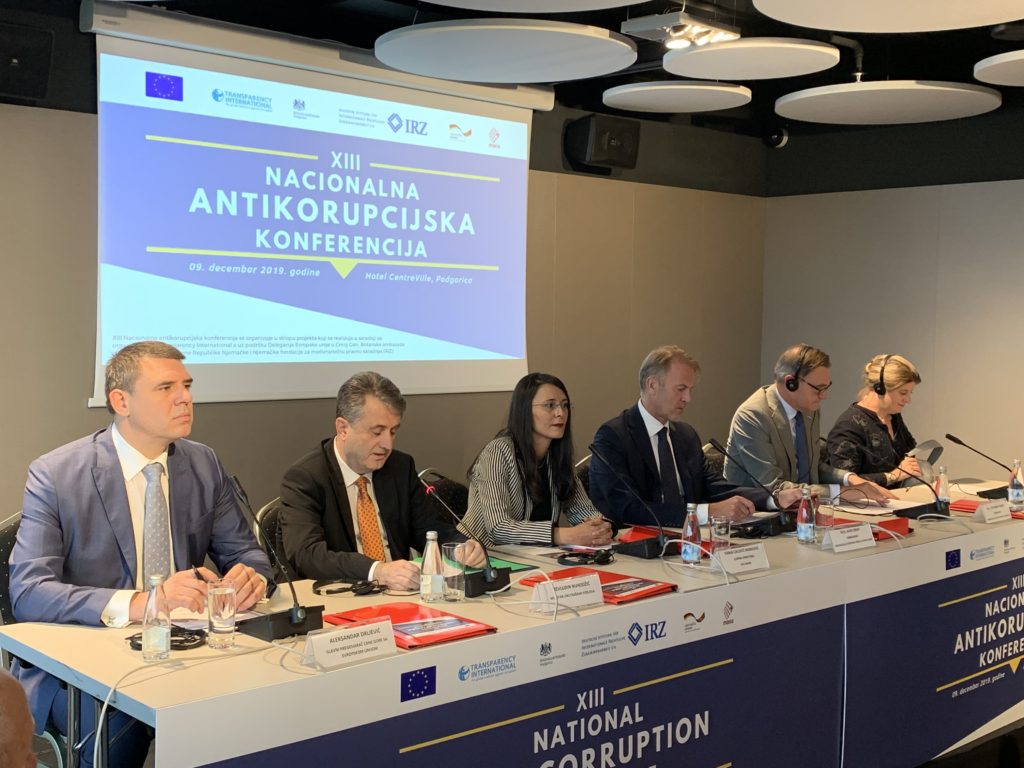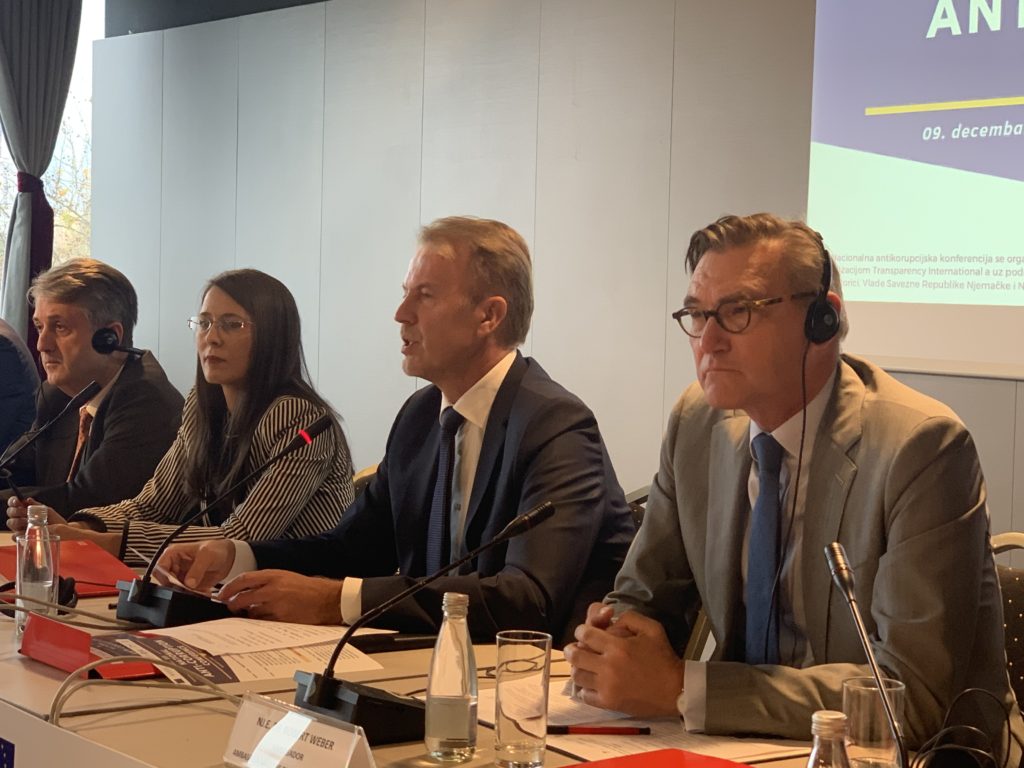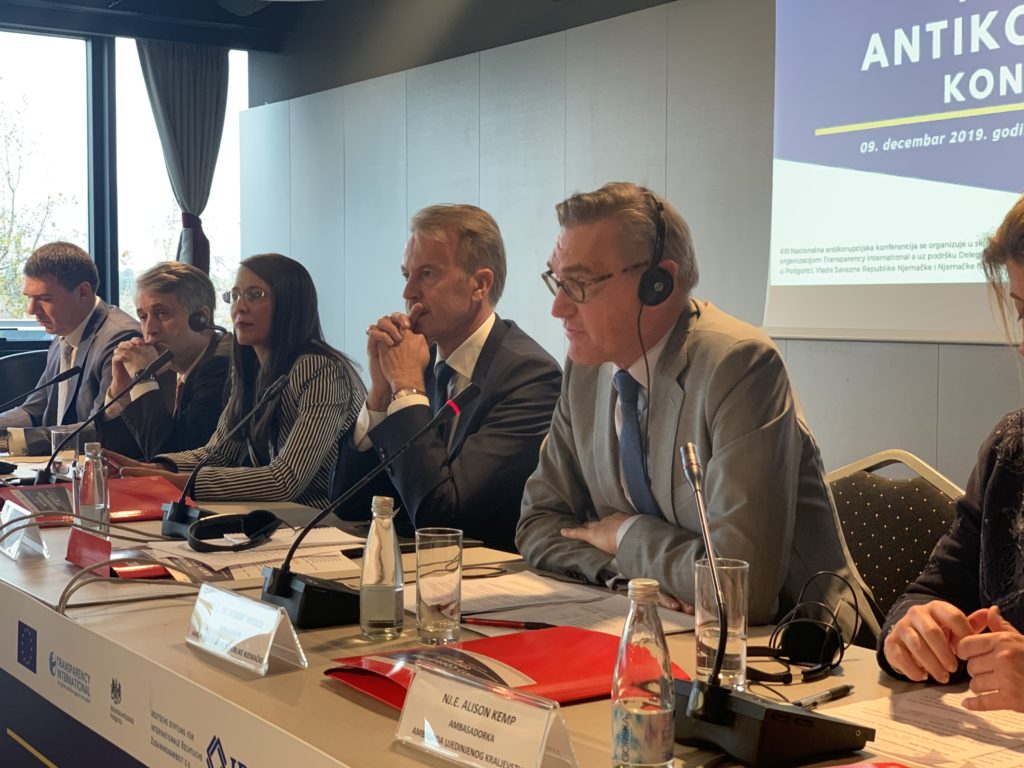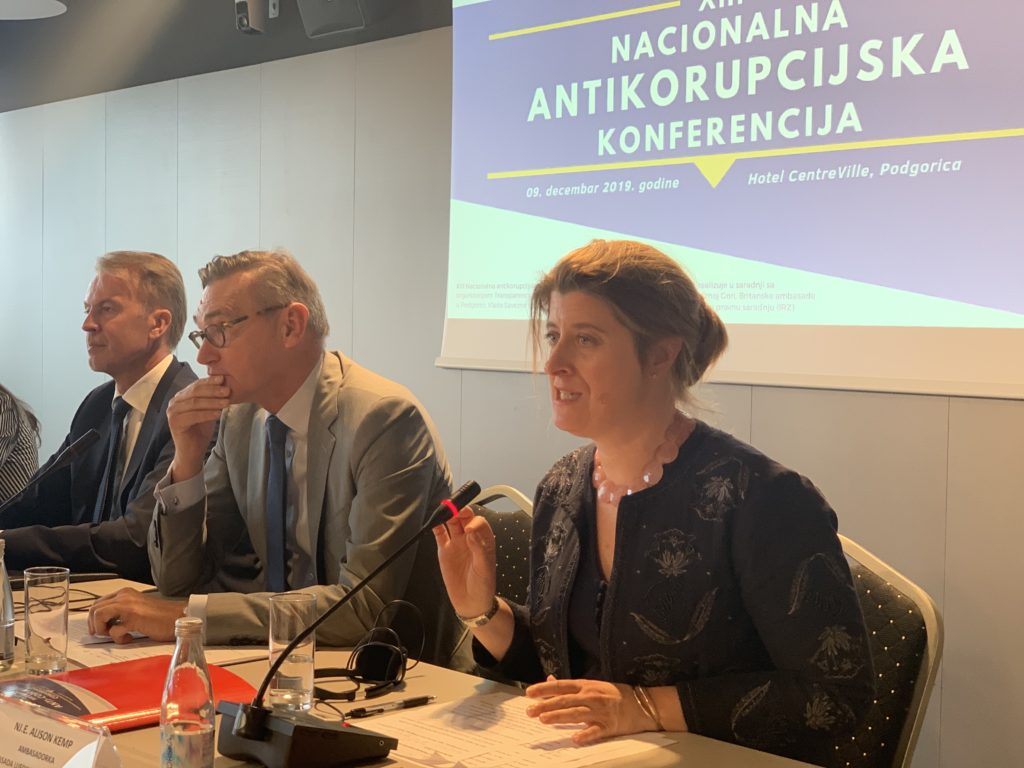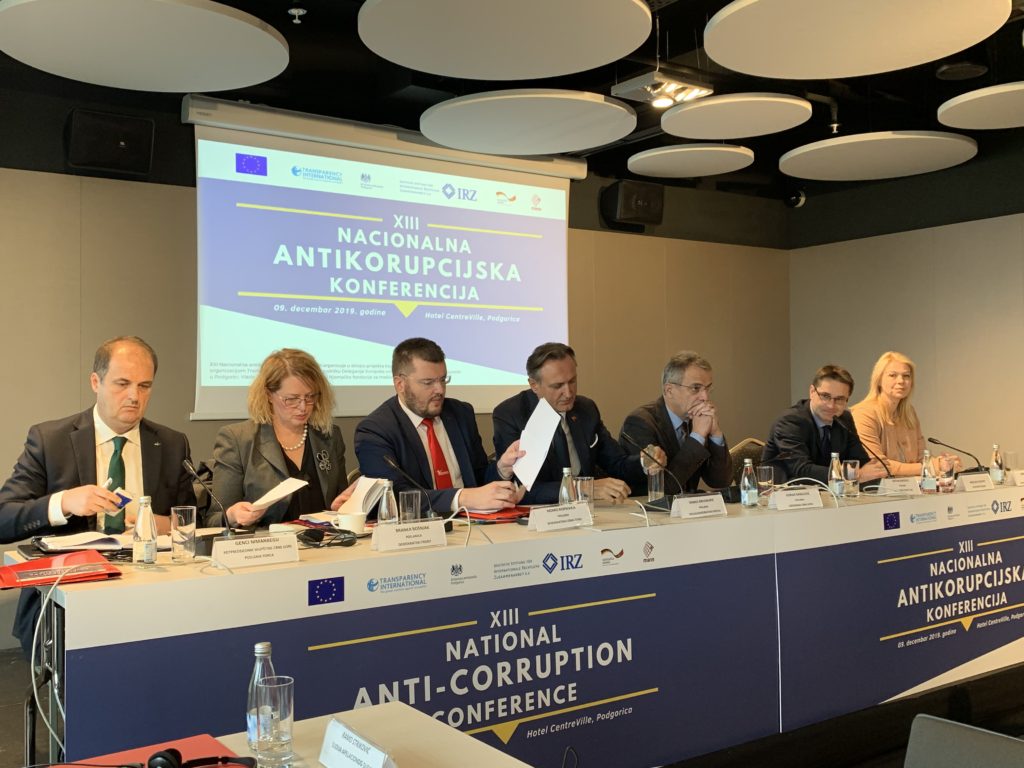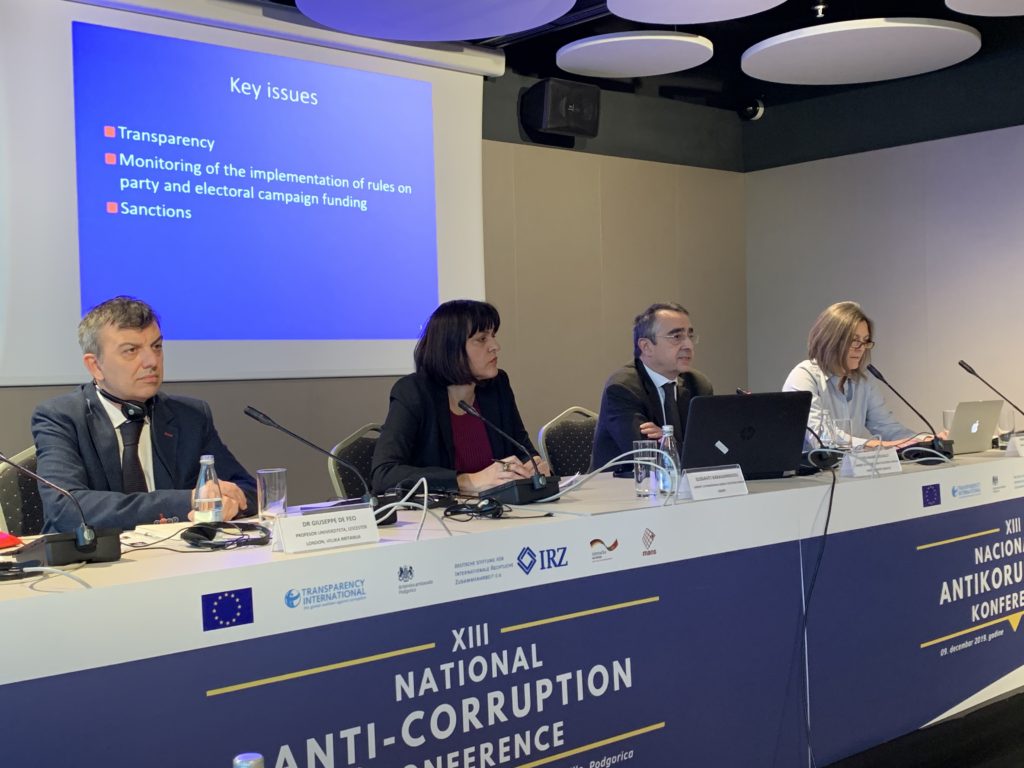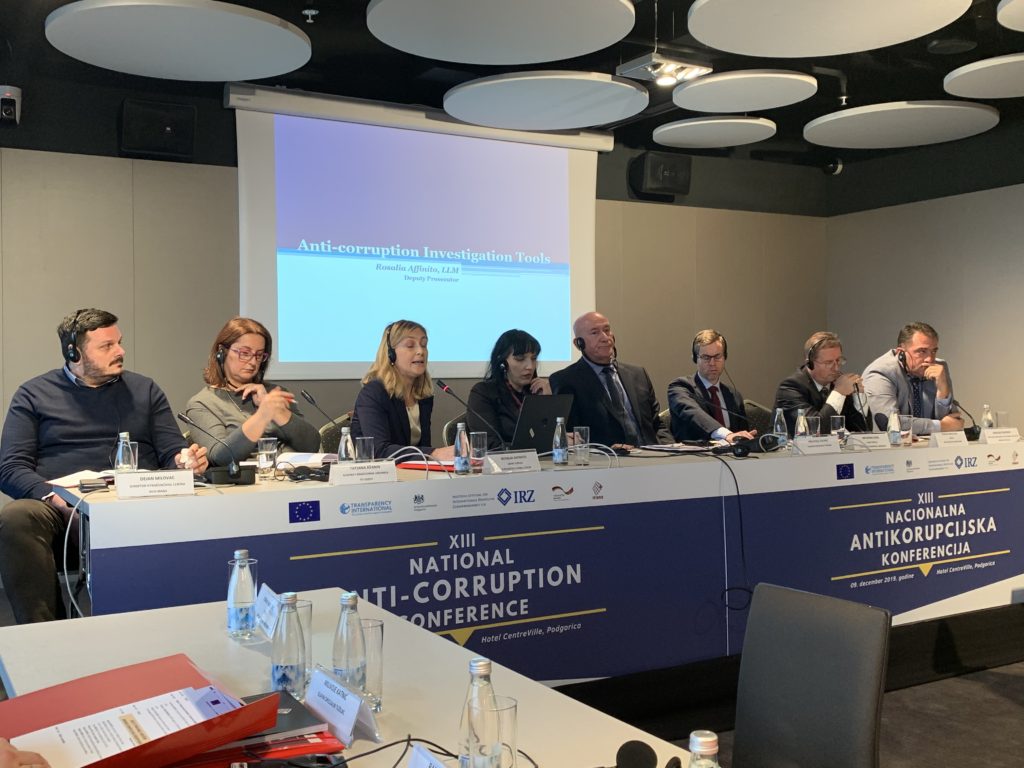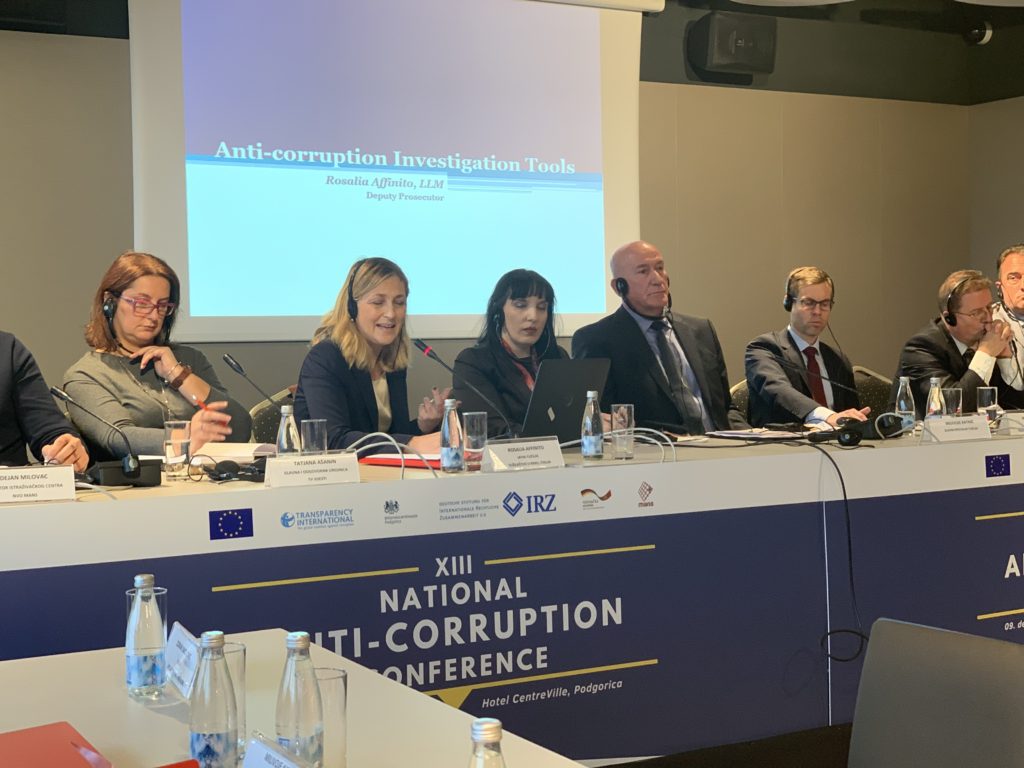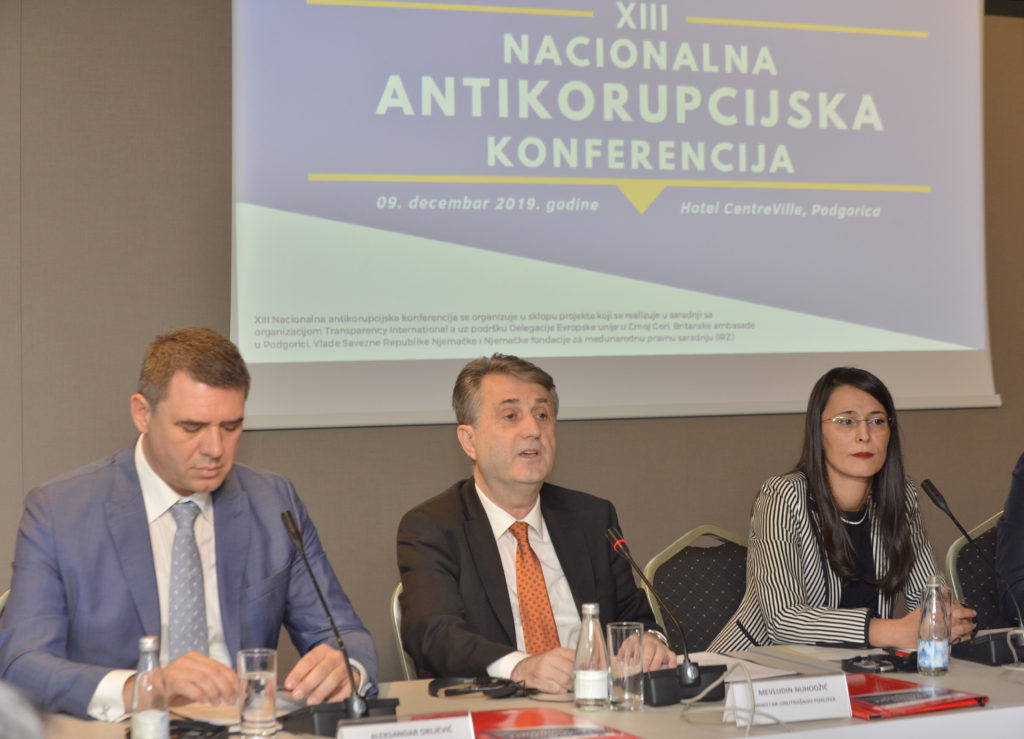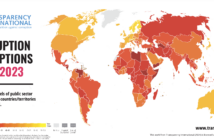REPORT FROM THE XIII NATIONAL ANTI-CORUPTION CONFERENCE
At times, fight against corruption in Montenegro reminds of the one between David and Goliath. However, no one should be untouchable in the fight against this phenomenon as it is the case now, it was concluded at MANS’ XIII National Anti-Corruption Conference. That is why this NGO demands that the illicit enrichment of public officials and the financing of political parties be criminalized.
The head of the EU Delegation to Montenegro, Aivo Orav, said that transparent, accountable institutions and strong criminal justice systems are key to preventing corruption and that Montenegro has reached some level of preparedness in this area.
“Montenegro has reached some level of preparedness in this area since the start of the negotiation process with the EU. However, corruption remains a concern and is still widespread in many areas,” Orav said at the national anti-corruption conference organized by MANS.
The Ambassador of Germany, Robert Weber, said that civil servants should be well rewarded for their work, and that transparent criteria should be established so that people could do their jobs better and not be prone to corruption.
“Of course, corrupt behavior should be punished,” Weber said.
The Minister of the Interior, Mevludin Nuhodžić, said that when it comes to agility of the civil sector, Montenegro is ahead of many, if not all neighbouring countries in the fight against corruption in this area.
He said that the Government finds the EC working document on Chapters 23 and 24 as a well-intentioned analysis:
“Ii is arguable how we read this document.” The government, he says, advocates responsible stance on corruption, saying that no one is exempted from that.
Montenegro’s Chief Negotiator with the EU, Aleksandar Drljević, said that building a stable system of the rule of law is a major challenge for the Government.
He said that in the field of high crime, the Special State Prosecutor’s Office had filed 29 charges by the end of 2018.
The UK Ambassador Alison Kemp emphasized that corruption should not be tolerated and that it is an important mission in Montenegro.
MANS, the organizer of the conference, estimates that the “Envelope” affair most clearly showed the connection between politics, crime and business. According to Vanja Ćalović, the Director of MANS, the judiciary has collapsed from top to bottom, while the Agency for Prevention of Corruption is a whip in the hands of the ruling party. She pointed out that those who have sunk deep into corruption know that their biggest enemies are not the institutions but the public.
“If the state wants to fight corruption, it must criminalize illicit enrichment of public officials and illegal financing of political parties. Submitting of false financial statements that do not contain donations from black funds, such as in the case of Envelope affair, or fictitious donations stated in Konik affair, must be clearly identified as criminal offenses. Foreign financing must also be criminalized. We demand that criminal offenses with elements of high and political corruption do not become obsolete so that one day some free and truly independent institutions could ensure that justice is slow but achievable”, said Vanja Ćalović, MANS’ Director.
According to international representatives at the conference, Montenegro has achieved some level of preparedness in this area since the start of the negotiation process with the EU, but corruption remains a concern and is still widespread in many areas.
Panel 1: Political corruption – key issue in Montenegro
Montenegrin opposition sent a clear message from the 13th National Anti-Corruption Conference organized by MANS – Montenegro has sunk deep into corruption, while a part of the ruling coalition admitted that this was an issue.
“Levels of political corruption start with Konik, from buying of people and votes, and ending with stuffing an envelope into pocket in a villa” – Independent MP Neđeljko Rudović described the situation in Montenegro vividly.
SDP leader and former President of the Parliament, Ranko Krivokapić, believes that when it comes to corruption, the situation in the country is worse than it was ten years ago.
“Both corruption and political corruption are incomparably greater now than they were seven years ago. We can easily diagnose this, there was no “buying” of MPs in Montenegro’s Parliament until 2015”, Krivokapić explained.
For Democrats, the biggest issue is the fact that next year we are expecting parliamentary elections and that the state authorities have no intention of dealing with political corruption.
“Political corruption is largely about selling laws and other regulations to some privileged structures,” says Momo Koprivica, MP from Democratic Montenegro.
The ruling coalition does not deny that corruption exists, but they do not agree with the opinion of opposition colleagues “that Montenegro is a captured state”.
“Although we are leaders when it comes to European integration, our institutions are still assessed by the European Commission itself as institutions that are not sufficiently independent. We have one big issue that the former President of the Parliament of Montenegro, Mr. Svetozar Marović, is still in Belgrade, while his plea guilty has resulted in him not being punished for what he has done and unfortunately, except for Vice President Zoran Pažin, very few public figures urge Serbia to do what it should – deliver up Marović”, says Genci Nimanbegu, Vice President of the Parliament and the Albanian Party FORCA.
At the panel on political corruption, the opposition assessed that the basis for beating corruption lies in the change of government. However, they have a different view of the means that lead to achieving that goal.
“Extra-institutional pressure, as well as peaceful democratic protests can contribute to that. Because this is a stagnation that we have to shake if we want to provide sound foundation and move all together towards healthier society and democracy”, says Branka Bošnjak, MP from DF.
“As long as representatives of the international community do not see that we have a problem that we cannot solve on our own, we will make no progress” – the leader of United Montenegro, Goran Danilović said.
“All we can do is not legitimize something that is completely wrong, and in this way the system will eat itself, i.e. Ćoćo will eat Vesna, and Vesna will then attack Duško, and Duško will attack the Special State Prosecutor’s Office and then they will simply tangle and become victims of a system they have built themselves”- Dritan Abazović, leader of Civic Movement URA, described vividly.
Although they were invited, DPS’ MPs did not attend MANS’ conference.
Panel II: International standards and expert recommendations
GRECO’s recommendations in the area of fight against corruption manifest themselves in three areas: transparency, monitoring and sanctions, said Yves-Marie Duoblet, political party funding expert (GRECO). He spoke, among other things, about anonymous and cash donations received by political parties and politicians.
– Many states prohibit anonymous donations, while some states prohibit cash donations. Anonymous donations are actually those in which its authors do not wish to be known to the public, while those who donate cash want to be named because they expect to receive certain privileges in return – says Doublet.
He notes that these areas are not regulated everywhere in the same manner. However, as he says, today there is a tendency in Europe to prohibit private donations for parties and candidates.
“This trend is like water, it will find its way somewhere, and somewhere it will not”, Doublet says. He says that in the whole story of controlling suspicious donations and transactions used by political parties and candidates for elections, apart from job transparency, it is very important that the monitoring bodies are independent, that they do not belong to any of the branches of the government and do not receive instructions from them. Such bodies, for example, have Austria, Switzerland and the United Kingdom.
“When it comes to Montenegro and Latvia, for example, GRECO’s recommendations also apply to financial investigations, and our recommendation is to increase the time period spent in these investigations, or to completely abolish the existence of obsolescence. We have also requested the introduction of effective and adequate punishment for such occurrences”, Doublet said.
Elissavet Karagiannidou, expert in Election and Political Party Financing (ODHIR) presented findings and recommendations issued for Montenegro after 2016 parliamentary and 2018 presidential elections. These relate to financing political campaigns, as well as misuse of state resources.
-It is good that there are norms in Montenegrin legislation regarding the prevention of misuse of national resources in election campaigns, but the problem is that we noticed that there are many issues in the implementation of these norms. We have also identified that there are no precise deadlines for the beginning of the pre-election campaign, and what is the deadline for receiving donations. Therefore, it is very difficult to record and report all financial flows. Bank accounts are opened quite late, and the law does not require political parties to report their expenses before election day. There is only a legal requirement to report revenues, not expenditures, and we think this is not good”, Karagiannidou said.
She also addressed the work of the Agency for Prevention of Corruption. She says they have made threats, that there have been some investigations, sanctions, initiated proceedings against certain parties.
“On the other hand, there has been hardly any proceedings for some apparent irregularities, such as the failure to open campaign accounts, investigations into vote-buying or inappropriate influence on voters. Because of all this, a number of our associates have questioned the impartiality of the Agency”, she concludes.
Independent anti-corruption expert Marijana Trivunović says that in the field of anti-corruption, there are two types of reforms that every state should keep in mind – the first is on “smaller and easier” and refers to a clear definition of terms in the law that relate to this area, such as clear defining of procedures.
– What is very important are the recommendations regarding sanctions. Because sanctioning, which should be appropriate and proportionate, is the key to future violations of regulations, as well as better transparency. Again, these are all quick and easy changes – Trivunović said.
Trivunović adds, however, that there is another category of more complex changes that need reform, not just the area covered by the Law on Financing of Political Entities.
-The systems are always connected, dependent on each other. And effective implementation of the regulations of the Law on Financing of Political Entities also depends on an adequate system of sanctions, adequate provisions of the Criminal Code, and of course on the capacities of the bodies implementing these regulations, such as the Agency for Prevention of Corruption – Trivunović said.
Panel 3: Detection and prosecution of the high-level corruption
Acting Chief State Prosecutor Ivica Stanković will be heard as a witness in the Special State Prosecutor’s Office case against the secretary of the Prosecutor’s Office Nenad Vujošević, Chief Special Prosecutor Milivoje Katnić said. The Special State Prosecutor’s Office confirmed that he would personally conduct the hearing of Ivica Stanković, noting that if he felt “emotion or empathy” at some point, he would entrust the hearing to one of the other prosecutors in the Special State Prosecutor’s Office.
The Special State Prosecutor’s Office has examined at least a dozen allegations against President Milo Đukanović this year alone, but in no case has there been any grounds of suspicion for initiating an investigation against the DPS president and the most significant political figure in Montenegro in the past 30 years.
The Chief Special Prosecutor Milivoje Katnić confirmed that the Special State Prosecutor’s Office dealt with charges against Đukanović but did not find grounds for suspicion of a crime.
“In the last year alone, several criminal charges were filed, maybe five, seven, 10, but at least that much. In all charges, the Special State Prosecutor’s Office ruled and never even raised grounds for suspicion that a citizen, Milo Đukanović, had committed any criminal offense in any capacity. The Special State Prosecutor’s Office, as the sole competent authority, has taken action and conducted all procedures that exist to the extent of the grounds for suspicion, and did not find any grounds for suspicion of a criminal offense, and that is a fact. We are the only ones authorized to do so in accordance with Law, and we did that. These are the results, which you do not respect and you have organized some para-trial and para-presenting of evidence here. I do not wish to participate in this”, Katnić said at the National Anti-Corruption Conference organized by MANS.
The Chief Special Prosecutor boasted that the Special State Prosecutor’s Office had made excellent results in four years since its establishment, quickly listed key data, and also stated that as of July 2015, 41 cases had been filed against 137 persons for criminal offenses with elements of corruption.
His “right hand” for financial and economic investigations, Jadranka Krunić, listed techniques used by the Special State Prosecutor’s Office and what they use in their work and discovering of evidence.
Chief of the Special Police Department, Dragan Radonjić, said that the Police Directorate could apply all methods used by Western European police, and that Montenegrin police cooperate with their European counterparts in that part.
-We do investigations and conduct international investigations with these police, and I can tell you that we are very successful in those investigations. We can apply secret surveillance measures, wiretapping, and any measures provided for by the Criminal Procedure Code. However, we have one restriction that has been in force for more than a year, because the Constitutional Court labeled some of the rulings in the Criminal Procedure Code as human rights threats, thus, certain secret surveillance measures that we applied were repealed – Radonjić explains.
He expects that these issues will be overcome very soon, and that they will again be able to apply all those methods they are currently being denied, which are very important in the fight against organized crime and corruption.
Director of the MANS Investigative Centre, Dejan Milovac, said that the Chief Special Prosecutor, to a very specific and direct question of whether to examine the president of the state, Milo Đukanović, about all cases in which he has been mentioned lately, and it is about hundreds of millions of Euros, answered “that this is a matter of ethics and moral”.
– I wish the State Prosecutor’s Office would provide results in fight against political corruption. Why didn’t you conduct a hearing of Đukanović, at least as a witness, when it was revealed that DPS was funded by Duško Knežević, and those donations are nowhere to be recorded in the party’s reports – Milovac said, to which Katnić responded that the State Prosecutor’s Office is above the parties and that it works according to its methodology.
Milovac said he would like the State Prosecutor’s Office to finally provide the public with information on the results in the fight against political corruption.
– Because we are talking about corruption, which is the mother of all corruption. What you are doing is a consequence of the fact that we have people in the system that allow hundreds of millions of Euros to be transferred from this country. One or two envelopes are not an issue, 10 envelopes are not an issue, the issue is that those envelopes are handed to political parties, which give them the opportunity to rule for another four years and hold this state in captivity – Milovac said.
He reminds that we do not have an adequate response to the affair Recording, for which we continually receive negative evaluations in the European Commission’s report, and criticism that it has not been processed.
Tatjana Ašanin, editor of TV “Vijesti” reminded of several high-profile corruption cases, but was persistent in getting answers from the Chief Special Prosecutor as to whether it was anyone’s fault that Svetozar Marović avoided serving a prison sentence by going to Serbia. She also asked about the secret account of the Marović family in Switzerland, which, according to earlier media reports, contained over three million Dollars.
Prosecutors from Italy and Germany, Rosalia Affinito and Björn Zier, argued that in their respective countries, an administrative check would precede possible criminal investigation in case of a disparity between an official’s income and his lifestyle.
Rosalia Affinito, Public Prosecutor from the Prosecutor’s Office of Rome, admitted at the conference that only a small number of offenses with elements of corruption had been detected in Italy, and that the “dark numbers” were much higher than the real prevalence of corruption.
She listed all the investigative methods they were using, pointing out that in the past year they had also been using the undercover agent institute, which helps them with investigations.

